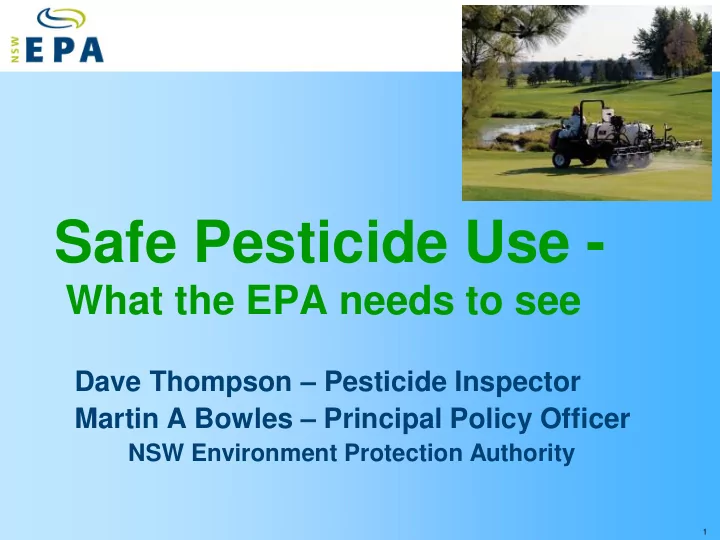

Safe Pesticide Use - What the EPA needs to see Dave Thompson – Pesticide Inspector Martin A Bowles – Principal Policy Officer NSW Environment Protection Authority 1
POINTS COVERED Regulators and their expectations Key legal obligations Recent compliance issues Doing things the right way Questions and discussion 2
KEY REGULATORS Safe and responsible pesticide use covered by: APVMA assesses & approves; regulates until point-of-sale NSW EPA: - regulates use of pesticides in NSW (ie after sale) – NSW Pesticides Act 1999 & Reg - pollution control laws – NSW Protection of the Environment (Operations) Act 1997 NSW WorkCover Authority - new national work health and safety legislation and codes 3
KEY LEGAL REQUIREMENTS Follow all label or permit instructions Only use registered products Prevent off-target harm: - Risk assessment - Due diligence Make records within 24 hours Repeat training each 5 years 4
RECENT COMPLIANCE EXPERIENCE Use of unregistered product without proper permit (eg ethephon) Off-label use without permit (eg atrazine, Vydate) Not following label instructions leading to off- target harm (eg. Fenamiphos, Nemacur) Some gaps or inaccuracies in record keeping Training not always current 5
FOLLOW LABEL INSTRUCTIONS Best way to ensure risk of off-target harm is minimised Assessment and registration process ensures most use risks have been anticipated Watering-in requirements Observe exclusion requirements – timing, signage, barriers – these can pose challenges Beware of label complexity! Problems arise? A dverse Experience report to APVMA http://www.apvma.gov.au/use_safely/adverse/agricultural.php 6
USE AN APPROVED PRODUCT In most jurisdictions use pattern approved for situation (some latitude in Vic) Ensure product is actually registered or allowed by a current permit (quiz reseller or use PUBCRIS or Permits search) http://www.apvma.gov.au/products/databases/index.php#pubcris No approved sports turf situations for atrazine since APVMA review 1997 7
AVOID OFF-TARGET HARM Not always enough to only follow the label Need to assess risks, ensure no off-target harm to people, plants, animals, property Due diligence defence (more on that later) No pollution of waters, strict liability offence under most environment laws Failure to properly implement label instructions can harm wildlife – eg fenamiphos 8
Incidents like this are fortunately mostly a thing of the past: Manly Lagoon 2001 (photo courtesy Manly Daily) 9
KEEP RECORDS (diligently) Pesticide records mandatory in some states and always good practice: - Date, start & finish time - Order of treatment - Crop or situation - Product - Rate of application - Total quantity - Equipment - Wind speed and direction Other relevant records, eg irrigation records for watering-in requirements, particular weather features 10
New e-form on its way: 11
UNDERSTAND YOUR LEGAL RESPONSIBILITIES Managing workplace pressure? Remember shared liability provisions of NSW pesticides legislation Enforcement officers have wide-ranging powers: - requisition reseller records - take samples - direct answering of questions Providing false or misleading information can be as serious as misuse offences Due diligence defence – take all reasonable measures to prevent mishap 12
Due diligence for Commercial user or Corporate manager : • Staff contract clauses ensuring knowledge of relevant laws • Pesticides Use Policy develop and implement • Documented Procedures – Record keeping, purchasing, training, pesticides use, storage, disposal. • Staff induction; ongoing training (toolbox talks, new products/equipment) • Auditing – internal, independent, unannounced • Board of Directors - awareness training • Adopt the Minimum Standard (golfing industry) 13
HAVE APPROPRIATE AND CURRENT TRAINING AQF Level 3 essential for unsupervised users NSW has mandatory five year renewal requirement (level 2 acceptable – direct supervision) Level 4 - a good skills investment for chemical program supervisors, assists due diligence/duty of care 14
STAY UP-TO-DATE Resources for evolving regulator and label requirements - PUBCRIS (APVMA) - State agency web sites eg. www.epa.nsw.gov.au/pesticides - Phone – eg NSW Environment Line 131 555 - Tap into extension services Stewardship programs of manufacturers, distributors and resellers Professional, industry association programs 15
16
LIKELY CHANGES WITH NATIONAL HARMONISATION Record keeping – similar to current Victorian and NSW requirements Training – minimum level 3 skill users of any Schedule 7s, other high risk products and Resttriced Chemical Products (plus more for latter) ‘ Access to chemicals ’ – minimum standards for varying from label instructions, including lower than label concentrations, and other pests Updated IGA expected May 2013, 18 months to implement! 17
FINALLY… This is a regulator’s perspective Turf pesticide applications - High public profile places - Open spaces strongly valued by community (and thought as environmental oases) - reflected in reports to NSW EPA EPA always happy to talk to you 18
Recommend
More recommend